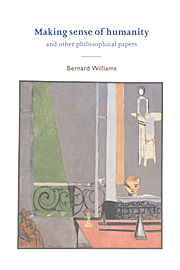Book contents
- Frontmatter
- Contents
- Preface
- I Action, freedom, responsibility
- 1 How free does the will need to be?
- 2 Voluntary acts and responsible agents
- 3 Internal reasons and the obscurity of blame
- 4 Moral incapacity
- 5 Acts and omissions, doing and not doing
- 6 Nietzsche's minimalist moral psychology
- II Philosophy, evolution, and the human sciences
- III Ethics
- Index
4 - Moral incapacity
Published online by Cambridge University Press: 28 January 2010
- Frontmatter
- Contents
- Preface
- I Action, freedom, responsibility
- 1 How free does the will need to be?
- 2 Voluntary acts and responsible agents
- 3 Internal reasons and the obscurity of blame
- 4 Moral incapacity
- 5 Acts and omissions, doing and not doing
- 6 Nietzsche's minimalist moral psychology
- II Philosophy, evolution, and the human sciences
- III Ethics
- Index
Summary
I am not concerned with an incapacity to engage or be engaged in moral life, but, on the contrary, with incapacities that are themselves an expression of the moral life: the kind of incapacity that is in question when we say of someone, usually in commendation of him, that he could not act or was not capable of acting in certain ways.
There are first-personal and third-personal aspects of this question, and one of my concerns will be to relate them to one another. Just for that reason, it may be helpful to mention at the beginning, chiefly to get it out of the way, a kind of case in which the first-personal aspect cannot come up: the kind of case in which A could not have done a certain (kind of) thing because he could not have thought of it, that it would never enter his head. A remark to this effect does not have to be a compliment, but it can be. However, the question whether it is a compliment or not is less important than the question whether the incapacity is related to what sort of person the agent is: as we may say, to his character. This will be true of other, more central, examples as well. The difference between an incapacity's being a matter of character and its not being so is, in itself, neutral between the favourable and the unfavourable. Being incapable of a certain course of conduct, in the relevant sense, and more particularly being incapable of thinking of it, may indeed be a virtue, but it can also be a failing, for instance a kind of feebleness.
- Type
- Chapter
- Information
- Making Sense of HumanityAnd Other Philosophical Papers 1982–1993, pp. 46 - 55Publisher: Cambridge University PressPrint publication year: 1995
- 7
- Cited by



